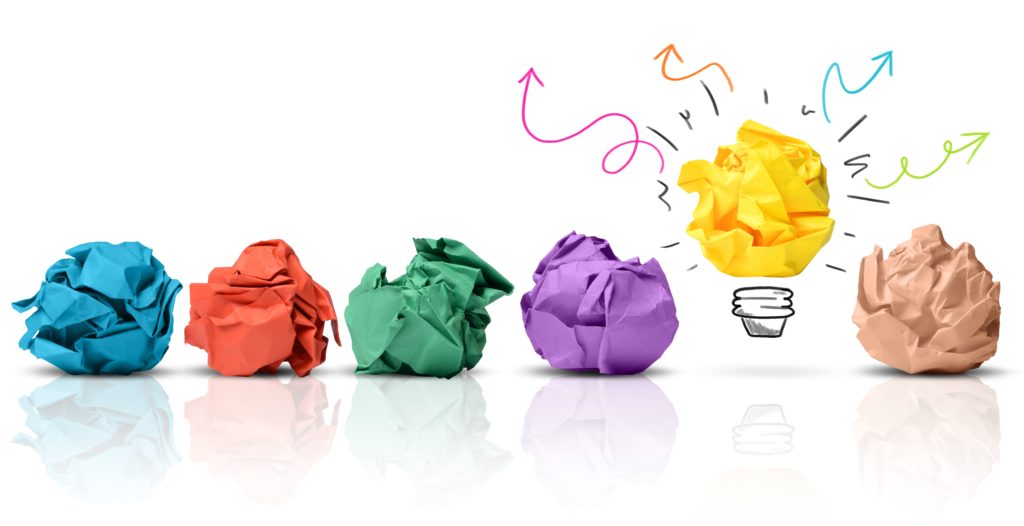Quick Hits
Daily brief research updates from the cognitive sciences

Can you learn creativity? Well, you can learn anything, and you can certainly learn to be more creative. But the big question is do those people high in creativity have brains that function differently? There has been a bunch of research that has promoted this idea that those high in creativity do have brains that function differently but there is still a lot to learn.
To help answer this question researchers at UCLA put exceptionally creative visual artists and scientists, known as “Big C” types (selected by a panel of experts and objective criteria) – into brain scanners to try to see what was happening in their brains during creative tasks.
And what did they find?
They found that, yes, creative people do use their brains differently and in an interesting way. When the brain processes information and engages in tasks the brain tends to send all signals through standard pathways and these are connected through various “hubs” such as a region called the thalamus. However, in creative people’s brains this seems to happen differently. They connect regions of the brains without going through these hubs.
This therefore suggests that this is an inborn process – I, for example, have no idea how to connect ideas without using my thalamus!
But this piece of research was also interesting because they compared different population groups specifically visual arts and sciences but also compared this to an IQ-matched comparison group to make sure this is not just a signature of intelligence. And they also found something else interesting.
They found that these Big C creatives had more efficient local brain connections at rest but when they ramped up on creativity tasks, they used the pattern above using less efficient but more divergent routes. So, this shows two things that are happening in the brains of creatives. They have efficient local connections and divergent global connections and when they ramp up for creative tasks their networks use less efficient but more novel pathways. That’s precisely why they’re so creative.
So yes, anther one to show that truly creative people do have brains that operate differently – how much can be learned is another question – but this seems to show this is a fixed attribute. But that is another question for another day.
I’m just trying to figure out how to make my brain less efficient!

Andy Habermacher
Andy is author of leading brains Review, Neuroleadership, and multiple other books. He has been intensively involved in writing and research into neuroleadership and is considered one of Europe’s leading experts. He is also a well-known public speaker speaking on the brain and human behaviour.
Andy is also a masters athlete (middle distance running) and competes regularly at international competitions (and holds a few national records in his age category).
Reference
Ariana Anderson, Kevin Japardi, Kendra S. Knudsen, Susan Y. Bookheimer, Dara G. Ghahremani, Robert M. Bilder.
Big-C creativity in artists and scientists is associated with more random global but less random local fMRI functional connectivity.
Psychology of Aesthetics, Creativity, and the Arts, 2022
DOI: 10.1037/aca0000463
More Quick Hits
Brain Scans Can Predict Your Political Affiliation
Quick HitsDaily brief research updates from the cognitive sciences rain scanning of political partisans is not new and it has long been reported that brain scans can predict political affiliation. But those studies were scans of political partisans...
Children with Same-Sex Parents Are Socially Well-Adjusted
Quick HitDaily brief research updates from the cognitive sciences his is not the first study to report that children of same-sex parents are well adjusted, there are plenty, but it is one of the first to be representative and hence gives some...
Simple Exposure to New Things Makes Your Brain Ready to Learn
ouldn’t it be great if we could learn things with no effort? Well, actually we often do, and children learn vast quantities of information, and knowledge with little to no effort – think of how well we learn languages which become fiendishly...
So, Can Cranberries Improve Memory?
tend to be hesitant to report on studies of single foods doing amazing things (because many do), but this piece of research still caught my eye. So, what did this group of researchers from the University of East Anglia find? Well, they...
The Real Problem with Social Media: It Induces Dissociative States
Quick HitsDaily brief research updates from the cognitive sciences ocial media seems to hijack our brains – or at least according to popular narratives. Most of us have experienced this where you get stuck in an endless stream of content,...
Adventurous Play Boosts Mental Resilience in Kids
o, a simple cheap way to help your kids improve all life skills and strengthen mental wellbeing. Too good to be true? Well, this piece of research, just out, finds a fascinating correlation with mental health and kids. This correlation was...






